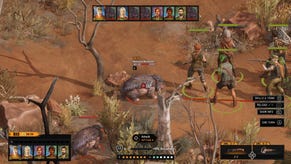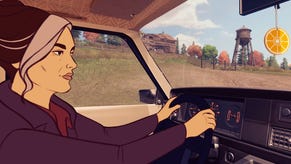Wot I Think - XCOM: Enemy Unknown (Singleplayer)
Alien resurrection
Oh dear, it turns out it's a first-person shooter with quick-time events and checkpoints after all. Move along, nothing to see here.
No, no, rest assured Firaxis' XCOM: Enemy Unknown is, like its 1993 predecessor X-COM: UFO Defense aka UFO: Enemy Unknown, a rich brew of turn-based strategy, base management, a sort of roleplaying and the sudden, frequent, horrible death of people you've developed an unhealthy fixation with, as you and your changing squad of soldiers struggle to save the Earth from alien invasion. This remake, until fairly recently, seemed like an impossibility - large publishers had lost faith that big-budget strategy games could pay for their yachts, iPads and watches heavy enough to beat a donkey to death with, and the X-COM name was sullied by spin-offs that had about as much in common with it as Hulk Hogan has with Stephen Hawking. X-COM was over, surely.
X-COM is back. I've waited 15 years for this, and now I can wait no more. Here's what I think. (Note - this write-up covers singleplayer only. Thoughts on multiplayer will follow at a later date).
I imagine you have three questions right now:
1) How faithful is Firaxis' remake to the original X-COM?
2) Does it work as its own game, not just piece of nostalgia?
3) Hey, is Shakira single?
1) It's complicated 2) Yes indeed 3) I'm afraid you'll need to battle footballer Gerard Piqué for her affections.
This statement is probably a little too navel-gazing, but right now I'm circling around this write-up trying to find a way in. I'm acutely aware of the need to balance any commentary on XCOM between addressing the questions and concerns of long-time X-COM fans and treating it as a brand new 2012 videogame aimed at at least as many people who don't know the original well or at all. This must be what an ideologically entrenched politician like Mitt Romney feels like when he tries to find words that will somehow appeal to two groups of people with fundamentally different attitudes towards society. Jim recently described XCOM as 'the critical challenge of the year', which only made me more fearful, damn his eyes.
So here's the thing: were one to make a list of X-COM's features and compare XCOM against them, it could only come up short. On paper, it would look like a disservice. I expect reams and reams of commentary from The Faithful about why this isn't here or why does this happen or why does this not happen. Some of those gripes I share, but most I do not.
If you are inclined to feel that there is simply no good reason to not replicate all that made X-COM great, I am inclined to believe that you simply will not abide XCOM, with all its alterations, omissions and new explorations.
I am even more inclined to believe that you'd be denying yourself a perfectly good time and what is for me comfortably the most absorbing and thrilling strategy game I've played in years. (I do not use that silly word 'thrilling' lightly, but I'll come back to that later.) I've been desperately worried about the game right up until the point that I played it. When I played it, I played it for some 50 hours and counting. I regret none of that time, I have missed showers, meals and Quality Time with girlfriend, cat and Dishonored in order to obtain it and I want to spend even more of it in XCOM instead of writing these damnable words.
Circling. XCOM is more like X-COM than any game save Terror For the Deep has ever been. It unashamedly wears an enormous, pulsing heart for its predecessor and inspiration on its kevlar sleeve: the tech tree, the rogue's gallery of alien species, the amorality, the accumulating devastation of its environments, the knuckle-chewing tension inherent in each and every gunshot fired. At the same time, it's a wildly different game - a new take on the same essential concept rather than a straight retread. In these confusing times where nostalgia threatens to overcome the desire for new experiences, I'm entirely glad of that. XCOM is a true 2012 game, not a 1993 game awkwardly wearing 2012 clothing.
There are numerous changes, but the essential one is not one likely to appear on that theoretical comparison list. Where X-COM's turn-based ground missions were hide and seek, an often frightening hunt for murderous lurkers concealing themselves across dense environments, XCOM's are more like a war. Unlike those desperate, chilling hunts across cornfields and through barns in X-COM, in XCOM where the aliens are is rarely in question. Their precise location is unknown and of course ever-changing, but their approximate position tends to be self-evident. They're either already heading towards you, are clearly where the screaming and explosions are, or are turned up in the natural passage of your soldiers moving forwards, making the issue of the day how to get close enough to them to take them out without getting turned into thin red paste wearing a shocked expression.
It's a game about slowly moving your frontline forwards, meticulously ordering a squad of six1 from cover to cover and making a stream of tactical decisions in order to overcome an enemy that always, always outnumbers them. You're directing a SWAT team that needs to stick relatively close together (not too close mind, unless watching a grenade liquidate four people at once turns you on), carefully clean out an area and move on, not the spread-out search and destroy agents of 1993. It's faster and more furious than its 90s ancestor, but it is no less strategic for it.
It works. It better than works. XCOM is muscular, tense, thoughtful, mutable turn-based strategy with the dramatic, explosive presentation of a contemporary all-action game. Also, the environments get unavoidably trashed on a grand-scale, in a fashion all too rarely seen in either strategy or action games: these are true battlegrounds. No matter how well you do in a mission, you'll leave a bombsite behind you. Frankly, you're probably doing more harm than good to the world.
Each bombsite begins as a place peppered with places of safety, but slowly turns into one filled with terrifyingly open, rubble-strewn spaces that you'll struggle to cross in one turn, let alone be able to fire off a shot or go into overwatch after moving. A soldier not in cover is a dead soldier, unless he's wearing the late-game stealth armour. Everything hinges on cover, a great deal of which is eroded or destroyed when pummelled by gunfire2 or targeted with explosives, and in addition to that the AI is pretty hot on flanking and flushing, so you need to move rather than camp at all times.
Any skirmish is a matter of man-management, tough decisions about whether to take the shots more likely hit to but less likely to kill, or to focus riskier fire on the most dangerous enemy, to creep closer to increase accuracy but putting your guy at greater risk, to try and save a downed colleague under a hail of green fire before they bleed out3, maybe to walk right up to an alien in the hope they can be stunned and captured alive4. Every move is a gamble. Every decision is critical. Your soldiers will miss more than they hit5, because they are merely frail, weak, terrified humans in a world whose technology and danger has suddenly increased a thousandfold, and each time they miss feels like the end of the world. Someone's probably going to die now, and it's entirely your fault (even though that soldier was the idiot who couldn't shoot straight at something not 10 feet away).
It isn't the end of the world, of course. The end of the world is very much on the horizon and approaching fast, but you have a great many tools to try and keep it at bay with. Foremost amongst those tools are your soldiers, who occupy a strange hybrid status of utterly disposable and incomparably precious. Ordering new/replacement soldiers is cheap, fast and easy, but a half-dozen rookies put together are no substitute for one lost Colonel or Major. For they are priceless. They matter more than your children ever could.
Where, in X-COM, a high-ranking soldier largely meant simply better stats, here it also6 means more Abilities - abilities which drastically alter the shape of the battle. Assault's run and gun, which allows shooting or going into overwatch after two moves rather than one, is essential for getting a shot in before the enemy does, a Support that carries three medkits rather than one is pretty much the most important unit in the field, a Sniper's crit-causing headshot will often one-shot armoured enemies and a Heavy who can take two shots per turn is often the only way to take out a Bezerker before it bearhugs one of your guys to death.
Despite the abilities, I did find that the ground missions can feel a little homongeous at times, with some similar-looking and somewhat confined settings, not a huge amount of verticality7, the more-or-less sure knowledge of where the enemies are and the constant requirement to hop methodically from cover to cover making a few feel like something to endure during the long wait for new types of equipment to be developed. But as new equipment, enemies and abilities are put on the table, new strategies blossom out of them.
A Support soldier's area of effect-upgraded smoke grenades become a way to more safely move a group of soldiers in closer to a deadly Cyberdisc or Sectopod, an Assault soldier's ability to take a free reaction shot whenever an enemy closes within four tiles becomes a reason to knowingly put him in danger so you can exploit it and, most of all, the late-game psychic abilities provide the foundation for new combinations of attack. I don't want to spoil all the surprises there, but suffice to say any Professor Xes you have on staff are game-changers. As are the Professor Xes the enemy increasingly fields. What were your most effective, most treasured soldiers suddenly become huge risk factors.
I don't miss time units, which had been perhaps my greatest source of concern before I played the thing, as there's a flow and a greater opportunity to devise a multi-turn masterplan with the new one move, one action system. It means tough decisions rather than coin-counting, rather than basically spamming your guys in various directions to see what you turn up. I see it as different rather than a replacement - as a result, the original X-COM can and will still serve a purpose in my life in addition to this new exploration of its themes.
I do, though, really miss free aim, which seems to me to be a sacrifice made for a console-friendly, jump to target interface. It's frustrating to not be able to get to an obscured alien even though you know full well the lizard-skinned bastard is crouching right behind a destructible bit of wall, or later on to not make your guys target an enemy you've mind-controlled, while the harsh8 limitations on grenades and rockets can leave me with the dull, intangible ache of a phantom limb. But these gripes are safely in the territory of "that's a shame," not "no sale".
It looks great, too - not as openly cartoon as the original, but definitely a B-movie comicbook. The animations are dramatic and characterful, again the devastation feels extreme, the redesigned aliens do threaten to be as memorable as their predecessors and there's a chunky, tangible solidity to environments and characters both. Again, that word 'thrilling' occurs: the look and the action-cam serve to accentuate, rather than replace, the tension/relief or distress cycle in each and every shot. Is it gonna hit is it gonna hit oh God it is hasn't/OH GOD YES IT HAS. It's a turn-based strategy game convincingly dressed as a third-person action game - but not a third-person action game pretending to be a turn-based strategy game. This is the real deal, but with presentation values the like of which TBS has never before seen.
My most serious reservations come up in reference to XCOM's other game, the base mode. Again, it looks great - the much-hyped Ant Colony mode presenting what was formerly top-down squares as a buzzing cross-section of activity. Unfortunately, I didn't look at that stuff after the first sight of it. Most of the rooms I went on to build I never even saw. There was no need to, but more damningly there was no sense of pride in construction at doing so. A base almost immediately sprawls beyond one screen, with a weirdly slow panning system to go see the rest of it, and almost none of the rooms do anything interactive. Once built, they add options to the crucial set of drop-down menus on the top of the screen, and in doing so shoot their own existence in the foot. There's no need to ever look at them again. It seems like a waste of creation to me, and by contrast to X-COM I wasn't imbued with the arrogant sense of being king of a private world built just for me.
Interception, meanwhile, is an almost bizarrely flat affair. While its radar-view simplicity was never X-COM's strongest suit, here it's reduced to even less. No choosing attack type or distance, just watching a 2D, side-on battle of shapes play out, with the option to click on one or some of the three buffs (attack, dodge, speed) you can research and build for weird costs (creating a dodge power-up requires Floater corpses, for instance). Interception also happens oddly infrequently, and most of your craft will be housed in never-seen hangars in other parts of the world. Never glimpsed, so never felt attached to. Interception feels incomplete, frankly, but it's a critical part of the game, unless you want all the funding nations to walk out in a panicked huff.
However, the stuff in those drop-down menus on the base screen? That's the good stuff. Oh baby, yes. There's no skimping there, with the vast majority of the original game's tech tree recreated, reimagined and then expanded still further. Big, generous handfuls of things to build, things to research and, newly, upgrades to existent gear and soldiers. With cash - gained from the increasingly untrusting nations who fund the XCOM project - and resources - collected from the battlefield - forever hard to get hold of in huge quantities, there's a constant dilemma over what to do, buy or build.
You'll always have long-term goals, but in the short-term your squad will field what you can afford, which of course hinges on how well you've played. Between not quite being able to build as many Plasma Rifles as you want and your best soldiers lying in the infirmary, recovering from grenades to the face and claws to the belly, you're invariably making do with what's available, hungering for something on the close horizon that might, finally, tip the odds in your favour.
That's part of the glorious tension that underpins every aspect of XCOM. The world's always against you - from the engineers who can't get off their fat arses and build a new satellite in less than 20 days to the flighty countries that withdraw funding because the tiny amount of funding they did offer wasn't enough to field an unstoppable defence, to the soldier who misses his shot and blows up a UFO flight computer you could have built vital kit with, to of course that implacable, infinite legion of fearless aliens. The defining moment of XCOM, one which I encountered all too regularly, is holding my head in my hands, muttering 'Oh God no' or more profane words to that effect.
Start on normal difficulty, just to learn the changed ropes. Then, for heaven's sake, change to Classic and Iron Man mode. Yes, there's joy to be had from gaining access to all the game's many, many toys and having your most beloved soldiers go the distance to the oddly underwhelming conclusion (I won't spoil, but there's no Cydonia or giant eyeball - though more positively you do get to lionise your favourite unit in a new way), but if you want XCOM to squat in your brain like a dark parasite whispering terrible things to you, you need to experience loss and suffering. On Normal, the late game becomes something of a cakewalk. On Impossible, it's basically a joke for masochists, though it will force you to use flanking in a whole new way. I tried it, failed the first mission four times, eventually made it to the second and then just laughed at the screen when it was all over by turn three. Some will love it, but I like a least a little pleasure with my pain.
Classic finds the Goldilocks balance, where the challenge is towering but eminently meetable. The optional Iron Man mode prevents reliance on savegames, so when someone dies that's it. It's horrible, to the extent that at one point I was exploring the game's filesystem and using undelete tools to try and resurrect my best Heavy. Fortunately, I didn't manage to, and as a result that devastating loss at the hand-like protrusions of a Cyberdisc becomes an enduring memory. Death and failure runs in X-COM's blood, and XCOM does not flinch from doing the same.
I have a slew of smaller complaints which I feel a tad churlish in bringing up, but it is important not to let my barely-bridled excitement at having a true-blooded new X-COM game on my PC get the better of me. The PC UI and control systems feels a little off - not hugely, but a bit rough around the edges and caught between two stools. However, I felt a lot more comfortable with it than I did the more restrictive gamepad controls.
Then there's the lack of setpiece events, compared to the original. Your base doesn't get invaded, you only invade one alien base, you don't go to Mars... Making up for this significantly is more variety in the general missions, such as bomb defusal and rescuing named NPCs, plus of course the Terror Missions that involve trying to evacuate as many civilians as possible even as the enemy aims its most fearsome beasties at your guys. I keep trying not to too constantly compare XCOM to X-COM, but it does follow so many of the same beats in terms of the event structure that these omissions were impossible not to notice, or indeed miss.
And there are bugs. It is not a buggy game as such, generally being a slick affair, but two big errors came up repeatedly in my many hours with the game. A camera issue in UFO missions that keeps seeing the view flick to the roof, sometimes meaning I couldn't make soldiers go where I wanted them to go, while soldiers flying around in the late-game Archangel armour had a tendency to become stuck in place (again usually inside UFOs) forcing me to play with a reduced hand. I'm sure they'll be patched in short order, but they did on occasion make things for difficult for me.
I'm also very disappointed that much of the soldier customisation - primarily armour colour, but a few more visual options too - has been partioned off into pre-order DLC (no doubt made available as an extra purchase later). This stuff doesn't lend you any in-game advantage, but as your attachment to your soldiers is such a critical part of the experience, and the ability to tweak their appearance such a critical part of that, a copy of the game with that element missing will be so much lesser. It opens up a world of personal roleplaying and even a little strategic help - for instance, all my medics were given red armour so I'd know at a glance where they were in relation to the rest of the squad, rookies I'd dress in hot pink so I'd know not to freak out when they bought the farm, while any soldier that made it to Sergeant would be themed to look like the Transformer I'd nickname them after. I understand the commercial need behind pre-order incentives, but this particular element plays such a huge part in the personalisation of a game that's all about personalisation. So I feel sort of bad about saying this, but do what you can to get a copy of the game with that stuff included, basically. Retail copies have it in there, so that might be the way to go even if it's less convenient.
Oh yes, and that soldiers have American voices regardless of nationality is distracting. Especially as I believe localised voices were recorded for other territories anyway. Modders, to arms!
Those, then, are the grumbles, but they are not the story. The story is that I love XCOM, I'm so glad it was made and I expect to be playing it and replaying it for a long, long time to come. There are things, big and small, I would change or don't see the reasoning for, but it all-told it does so much more than I ever thought possible, both in terms of resurrecting XCOM's core values and making a turn-based strategy game with high-tech, 2012, thrilling presentation.
This isn't a matter of a starving man grateful for the slimmest of pickings. XCOM is a bounteous strategy/roleplaying feast, and I'm not particularly dismayed that a couple of the side-dishes taste a bit suspect. It's a triumph that XCOM even exists, so that it's also bloody brilliant and thoroughly modern with it excites me to introverted core. X-COM's tiny, precious world has seen many unwelcome invaders over the years, but trust me - this one comes in peace.
XCOM: Enemy Unknown is out tomorrow in North America and on Friday on Europe, because retailers are asses.
Footnotes
1 You start with a squad of but four, but quickly can - and should - upgrade to five and then six if you have enough cash and a soldier of a suitably high rank. It is the most essential upgrade in the game.
2 Scenery destruction depends somewhat on the gun used. The entry-level, bullet-based weapons don't do much damage to non-organic matter, but by the time you're up to plasma weapons you can expect to see rocks and walls disintegrate. However, there is no free aim for weapons other than rocket launchers and grenades, so you cannot deliberately target specific parts of the environment in the hope of making a sheltering enemy more visible. As such, scenery destruction happens only when a shot misses, and even then only occasion. This does frustrate me, as I'd love to, say, have a Heavy remove a section of wall to open up a clear line of sight for a Sniper ally. I suspect free-aim will be the most called-for mod/patch, and I hope someone makes it happen. Between your guys and the aliens, however, rest assured that every mission will see loads of devastation.
3 Usually soldiers, and especially rookies, will flat-out die when wounded fatally, but there's a chance they'll go into a critical state from which they can be stabilised or revived if you can get someone with a medkit over to them within three turns. You can buy an upgrade in the Officer Training School which increases the odds of high-ranking soldiers going critical rather than perishing outright.
4 If an alien dies, its weapons explode and so can't be taken back to be equipped. So Stuns aren't there just to enable the interrogation of live aliens. With cash and components forever in short supply, capturing rather than killing thus becomes a vital, but forever risky, means of upgrading your soldiers' equipment.
5 My preferred sniper would for some reason almost always miss a shot with 95% hit chance. This made me very cross indeed. But when, in the late game, with her plasma sniper rifle and upgraded SCOPE, she did hit with the sniper-standard Headshot ability, it would usually crit and thus insta-kill - activating her upgrade that then allowed her to take a second shot. Sometimes, this would roll to a third. She became incredible at thinning enemy ranks without having even left her starting position. Just so long as that first shot hit.
6 A smaller number of stats do remain, but don't play an active role in things. A Sniper is always and only a Sniper; an Assault soldier can't use a Sniper rifle no matter how good his/her stats; a higher-ranking soldier has better odds of hitting and more health points than a lower-ranking one does. You can add items that alter some of these, most pertinently the scope for accuracy and chitin under-armour vest made from downed Chrysalids for health, but other than that the stats self-manage. But there is one stat that does matter, and heavily so in the late game - Will. In the early game, this affects the likelihood of troops freaking out if they're wounded, they spy a large pack of enemies or a comrade dies, but once psychic creatures enter the fray soldiers with low Will are prime for mind control and other mental attacks. Soldiers with high Will are more likely (but most certainly not guaranteed) to have the gift of psychic powers themselves.
7 Verticality is primarily of use to snipers, who gain bonuses if on higher terrain as well as often having a larger field of vision. Sniper-specific armour offers grappling hooks with which to reach different levels. Some maps - for instance, the forest setting used for assaulting crashed UFOs - have very little in the way of verticality, which can make using snipers a mildly frustrating matter of forever shuffling them forwards, while others positively depend on it. The larger scale UFOs have a second level which you'#ll want to get snipers up to asap, while Terror Missions often see aliens murdering civilians on the second floor, so you'll need to hot foot it up there quickly. But, all told, there's a lot less multi-height combat than in the original game. Again, this is about pushing a front-line forward more than it is scouring an environment.
8 Each soldier can carry one item in addition to their two weapons. So, it's grenades or medkits or SCOPE or chitin or stungun or assorted other things, as apparently this internationally-funded military operation can't afford belts or bags. On top of that, one grenade is the only and only grenade that soldier can carry, so use it wisely. However, an optional Support class ability lets them carry two items, and a Heavy one allows two grenades. The restrictions are frustrating and not a little illogical, but there are, I think, two good reasons for them. Firstly, there is terror in seeing an icon that could have saved someone's arsed greyed out, forcing you to devise an emergency alternative tactic (or, y'know, die). Secondly, adding willy-nilly use of explosives to the aforementioned levels of inadvertent devastation would likely mean each level become a smoking wasteland within a couple of turns.
























